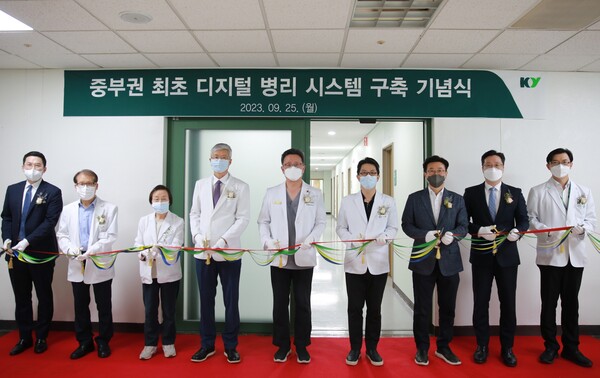Philips Korea said on Tuesday that it installed its digital pathology solution at Konyang University Hospital, making the hospital the first university hospital in the central part of Korea equipped with a full digital pathology system.

Philips IntelliSite Pathology Solution is a digital pathology image generation, visualization, and management system based on an image management system equipped with slide scanners and servers, storage, and viewers. The system was first approved in Europe in 2014, followed by the U.S. in 2017, and Korea in 2018.
As the aging population increases, the shortage of pathologists is intensifying around the world, leading to the introduction of digital pathology solutions that maximize the efficiency of pathology diagnosis processes.
According to a recent Physician Specialty Data Report by the Association of American Colleges, the number of active physicians in pathology has decreased by 7.7 percent over the past five years. Traditional pathology reading methods place tissue samples on glass slides and analyze with an optical microscope but digital pathology automatically classifies slide data based on codes generated during scanning and is implemented directly on the monitor and stored on the system.
These digital pathology systems help pathologists relieve the burden of processing and reading tissue samples and improve their workflows. In addition, the digitization of slide data facilitates long-term research and documentation, resulting in quick and accurate decisions about patient care.
Konyang University Hospital introduced Philips IntelliSite Pathology Solution to complete the link between the hospital's Laboratory Information System (LIS) and Phillips Image Management System (IMS). This completes the establishment of digital pathology workflows in hospitals and allows external advice by sending anonymized pathology images through the demilitarized zone (DMZ) server rather than the physical movement of sample slides to deliver quick and accurate test results to patients.
"It is meaningful to introduce our digital pathology solution to Konyang University Hospital, which is devoted to realizing patient-centered care," said Philips Korea CEO Park Jae-in. "We will help establish an environment where patients can access rapid and accurate diagnosis through our experience in the digital pathology field."
"The establishment of a digital pathology system will greatly improve the workflow of medical staff and provide rapid and accurate diagnosis to patients for high-quality medical services,” said Lee Choong-sik, director of pathology at Konyang University Hospital.

